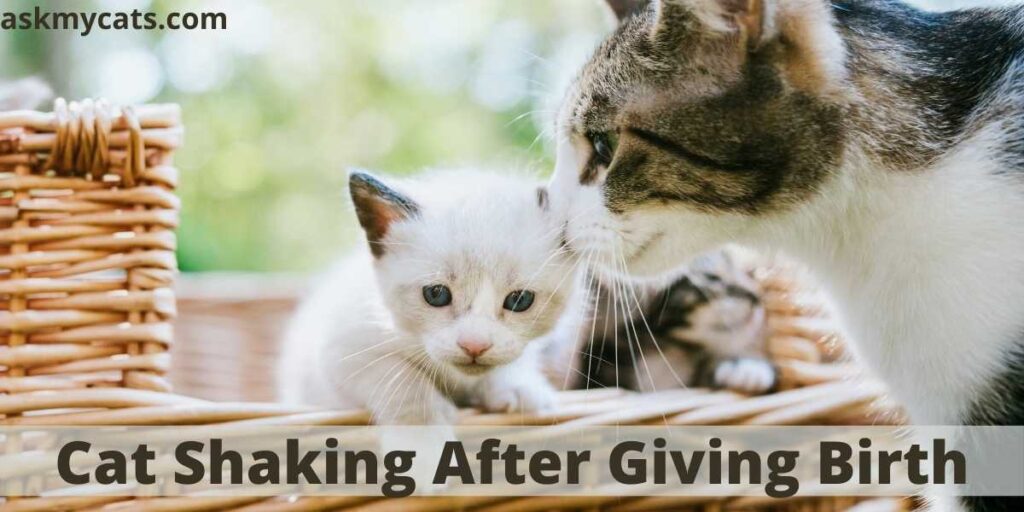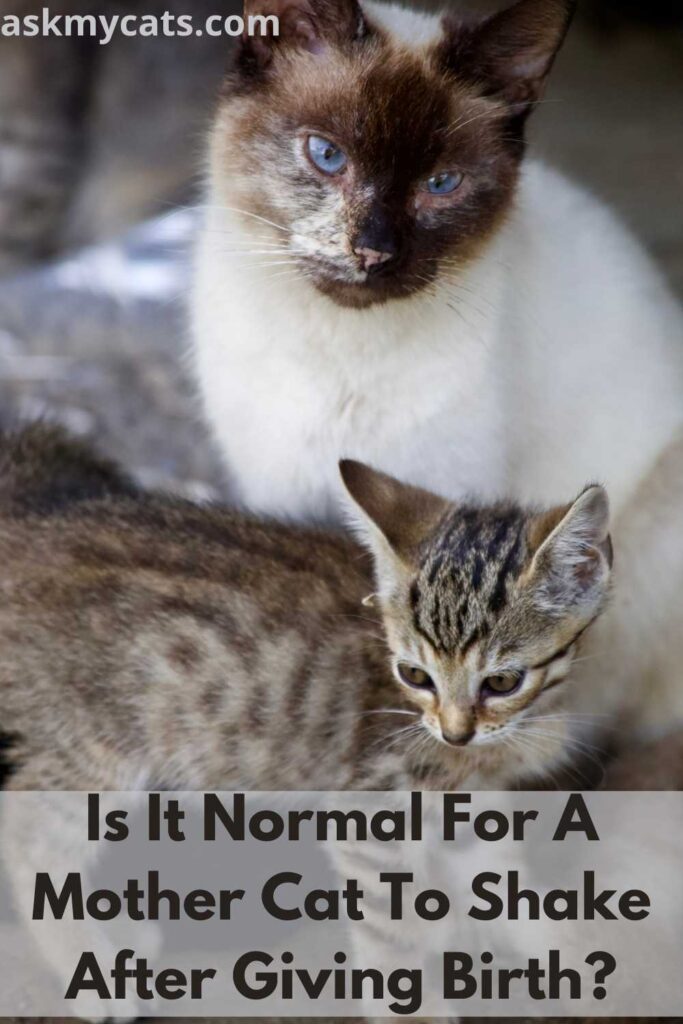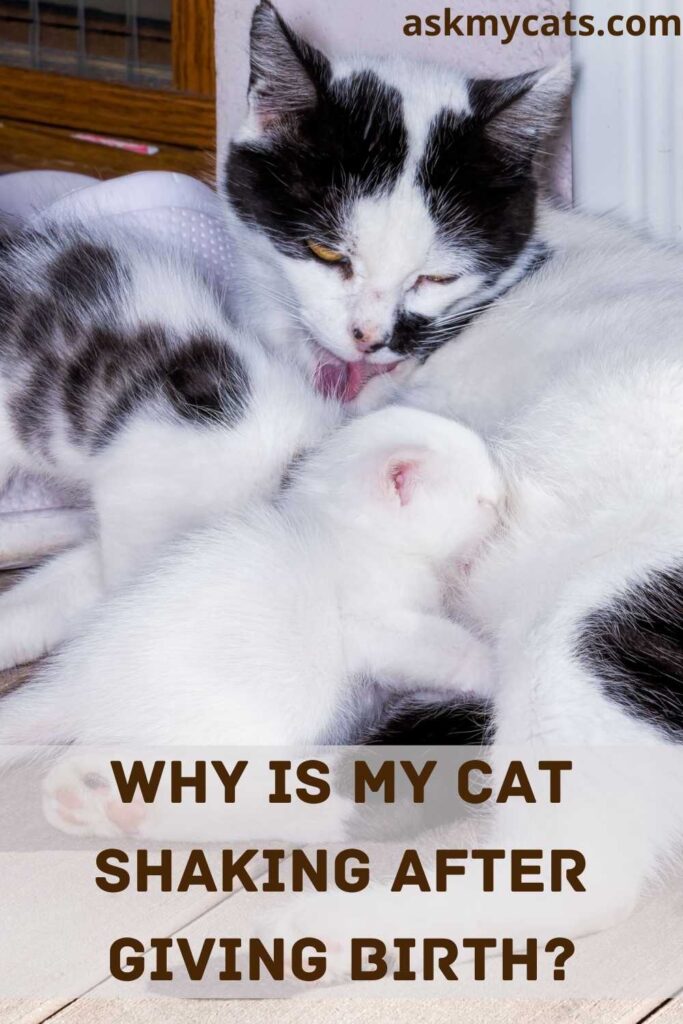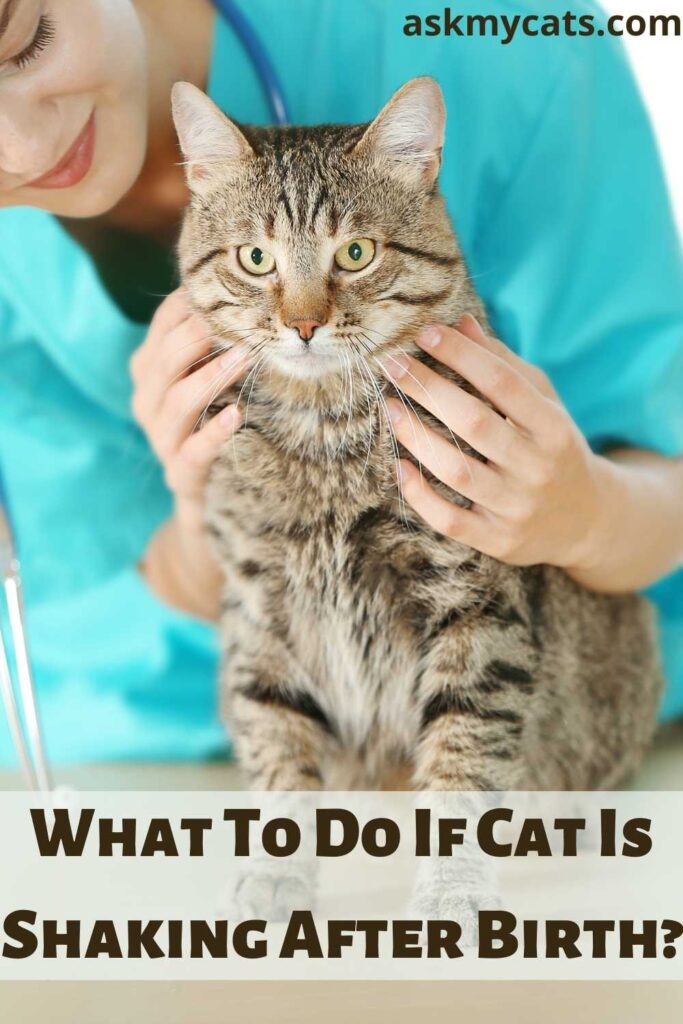It’s alarming to see your cat shake violently after giving birth. Tremors might be localized to one part of their body, such as their head, tail, or legs, or they can tremble throughout their entire body.
So, what is the reason behind your cat shaking after giving birth?
The reason behind your cat shaking after giving birth might simply be a slightly cold room, which can simply be fixed by turning up the thermostat. Other times, its shaking can be a symptom of an underlying disease.
Keep reading this article to know more about, why your cat is shaking after giving birth.


Give Your Cat the Perfect Day
Get the Free Ebook!
Is It Normal For A Mother Cat To Shake After Giving Birth?
No, it is not normal for a mother cat to shake after giving birth.

Shaking cats after giving birth can be caused by a variety of factors ranging from behavioral to environmental to medical.
Fortunately, there are a variety of treatments available to both halt and help with tremors.
Here are some of the most prevalent causes of your cat’s trembling after giving birth.
1. Hypoglycemia
One of the most prevalent causes of your cats trembling after giving birth is hypoglycemia.
Hypoglycemia is a glucose deficit, therefore your cat’s low blood sugar and shivering or shakes could both be signs of the illness. It’s usually the result of them not eating for a long time.
Giving senior cats a few drops of honey or maple syrup every six hours will help them settle down.
Directly applying honey or sweet syrup to their gums can assist the sugar to enter their bloodstream more quickly.
If your cat is still shaking and not eating correctly, it’s important to contact your veterinarian.
A blood test, which can provide answers, will almost certainly be performed by your veterinarian.
2. Fear, Phobia, Anxiety
Cats, like humans, can be startled and shaken. Cats can have phobias, which can cause them to become anxious.
For cats, the most prevalent phobias are pyrotechnics and thunderstorms. Because both of these events produce excessive noise, which is exacerbated by their acute sensitivity to vibrations and powerful hearing, it is not uncommon to notice your cat shaking in these conditions.
Other common scenarios that cause your cat to shake or tremble are if your pregnant cat has been through trauma or suffers from separation anxiety.
Other indicators to look for in an anxious or terrified cat, aside from the shaking, including hiding or diarrhea.
If you suspect your cat is worried, you should speak with your local veterinarian about getting suitable treatment or medicine for your feline friend.
3. Irregular Body Temperature
The usual body temperature of a cat is between 100.5 and 102.5 degrees Fahrenheit. Anything above 102.5°F can suggest ailments like fevers, while anything below 100.5° can cause serious health problems including hypothermia. Both can cause your cat to tremble.
Hyperthermia is an increase in body temperature that can occur when a cat is exposed to hot conditions. Leaving a cat in a hot car is a common example of this.
Fevers are also a sign of a high body temperature in cats. Your cat may suffer from heat-related disorders such as heatstroke or heat exhaustion if their body temperature is not controlled.
Hypothermia, or a drop in body temperature, can cause a cat to shake after giving birth. If not treated, this can be fatal to your cat.
You may aid your cat by giving them blankets to help them get their body temperature back to normal.
However, if your cat has an exceptionally high or low body temperature, contact your veterinarian straight once.
Also, check out about kitten twitching & why do baby kittens twitch when they sleep
Why Is My Cat Shaking After Giving Birth?
One of the main reasons why your cat is shaking after giving birth is Eclampsia.

Eclampsia is a sudden onset of possibly fatal hypocalcemia in cats.
The abrupt transfer of circulating calcium from the blood into the mother’s milk during breastfeeding causes eclampsia.
Hypocalcemia is most commonly caused by a female’s insufficient nutrition during pregnancy, although it can also be caused by big litters of kittens.
Calcium is lost not only during lactation but also during pregnancy when the mother’s blood calcium is required for fetal growth.
Eclampsia is a condition that develops four weeks after the queen has given birth and is characterized by clinical neuromuscular symptoms and low blood calcium levels.
Eclampsia is a fast-moving illness that must be treated within 12 hours after the onset of symptoms or death is likely.
Eclampsia, on the other hand, is a transient ailment for those cats that were diagnosed and sought therapy right afterward.
Eclampsia is a life-threatening illness in cats, characterized by dangerously low blood calcium levels, resulting in hypocalcemia.
Eclampsia, also known as puerperal tetany or milk fever, is a common disease among nursing queens caused by the loss of blood calcium levels during lactation.
Feline moms who are not fed a sufficient diet to meet their nutritional needs in order to feed their children acquire the disease within a month of giving birth.
The first indicators of eclampsia are anorexia, restlessness, and shaking, which quickly escalate to neuromuscular irritability.
Eclampsia in cats can swiftly result in death, hence this form of hypocalcemia should be handled as a medical emergency.
Symptoms of eclampsia in cats:
The early signs of eclampsia in cats are mild initially, with cat owners only noticing minor behavioral changes. The mother may become tense and restless, as well as pant excessively.
The affected feline will exhibit clinical symptoms when the calcium levels drop more, including: –
- Shaking
- Pacing
- Anorexia
- High fever
- Lethargy
- Increased respiratory rate
- Disorientation
- Muscle spasms
- Convulsions
- Neuromuscular irritability
Causes of eclampsia in cats:
Eclampsia is a disorder that affects pregnant or nursing cats. The illness is most frequent four weeks after giving birth, however, it can happen any time before or after that month.
The following are some of the most common causes of eclampsia in cats: –
- Lactation is the process of producing milk and obtaining blood calcium to deliver to nursing kittens.
- Poor nutritional absorption through the digestive system, causes the calcium mineral to be eliminated rather than captured.
- A pregnant or lactating queen’s diet is deficient.
- Pregnancy, because fetal development necessitates a significant sacrifice of blood calcium.
- Large litters of kittens, as the mother, must produce a large amount of milk to meet the needs of her offspring.
Diagnosis of eclampsia in cats:
Eclampsia in cats is a life-threatening emergency; therefore, veterinary professionals are trained to recognize the clinical signs.
The first diagnostic test, known as a physical examination, will be the behavior your cat exhibits.
To establish a diagnostic baseline, the feline doctor will review your cat’s medical record for allergies, drug reactions, and previous illnesses.
Expect your veterinarian to ask you a number of questions about the feline, such as her symptoms, a time frame for clinical signs, and the date she gave birth.
A biochemistry profile will most likely be requested to reveal hypocalcemia in the cat’s blood in order to obtain a direct diagnosis.
Treatment of eclampsia in cats
Eclampsia in cats must be treated right away because the prognosis for this feline condition worsens after 12 hours of clinical signs.
Slow administration of calcium gluconate is the standard treatment for felines with eclampsia.
The supplement is given intravenously, directly into the feline’s bloodstream, which necessitates careful monitoring to ensure that the feline is not given too much calcium at once.
If your cat is experiencing seizures or muscle spasms, the veterinarian will treat the condition with medication until the feline is stable.
- Infusion of intravenous drug therapy immediately followed by calcium gluconate supplementation
- Vitamin D supplementation is recommended because this essential vitamin aids in calcium absorption in the body.
- Tetany and seizures can be controlled with anti-seizure medication.
Once the feline is stable, the doctor may recommend a change in diet and calcium supplement tablets to be administered at home.
What To Do If Cat Is Shaking After Birth?
The first thing to do when you find your cat shaking after birth is to take her to the vet immediately. If the vet is far away, you can try giving your cat a few drops of honey.

If you suspect your cat has low blood sugar (hypoglycemia) and she is unable to eat on her own, you can give her some honey or maple sugar with a dropper; this will quickly bring her glucose back up.
If you notice hypoglycemia on a regular basis, you should take your cat to the vet for some blood tests.
It is possible that you will need to change your cat’s diet or feed her more frequently.
In kittens or sickly adult cats, hypothermia can be fatal.
The underlying cause of the hypothermia must be treated by your veterinarian.
A heating pad, heated blanket, or a heat lamp can be used to help your cat maintain proper body temperature until you can get her to a veterinarian, but use caution because these devices can cause thermal burns.
Hyperthermia is frequently caused by a fever caused by a virus or infection, which must be diagnosed by your veterinarian.
Secondary illnesses such as shock, toxicity, and pain are frequently encountered and must be treated professionally.
Psychological issues are slightly different in that you must determine what is causing your cat’s anxiety and keeping her from overexertion and overstimulation.
Blood tests can help determine if your cat has kidney disease and the best course of treatment for your cat.
Also check out about why is my cat vibrating
Frequently Asked Questions
How long does it take for a cat to recover from eclampsia?
If your cat’s eclampsia is diagnosed and treated promptly, she should recover completely and quickly. After she is released from the hospital, your veterinarian will most likely send you home with oral calcium supplement pills and will instruct you on how to safely wean the nursing kittens from the mother. Follow-up appointments are likely, as the doctor will want to assess the feline and her newly added vitamin supplementation.
Can eclampsia be prevented?
All pregnant cats should be fed a high-quality diet rich in essential vitamins and minerals and specifically designed for pregnant and nursing mothers. If the mother is in danger, the kittens may need to be separated from her several times a day to allow her to eat. At three to four weeks of age, the kittens can be supplemented with a milk replacer and transitioned to kitten food. Pregnant and nursing cats should not be given calcium supplements or dairy products. Excess calcium consumption during pregnancy or nursing can reduce parathyroid hormone production and increase the risk of developing eclampsia. Your veterinarian can advise you on whether your cat requires supplementation.
What is premature delivery?
Occasionally, a mother will give birth to a litter several days early. Kittens may be small and thin, with little or no hair. They can live, but they require a great deal of care because they struggle to maintain body heat and are frequently very weak and unable to swallow. Some may be able to nurse, but they are frequently so weak that they must be held close to the mother. Kittens who are unable to nurse can be fed with a small syringe, bottle, or stomach tube (stomach tubing should only be attempted with veterinary instruction and/or supervision). Your veterinarian can provide you with the necessary equipment and instructions.
Final Words
If your cat is shaking after giving birth, the best course of action would be to take her to the vet, as it can prove to be fatal. Your vet can guide you on how you can best take care of her.
If you have any questions, ask us in the comments section.
